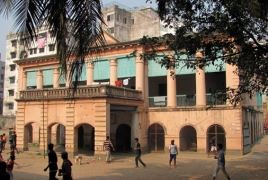How Armenians contributed to social life in Dhaka: The Daily Star March 6, 2018 - 14:39 AMT PanARMENIAN.Net - The Armenians most probably came to Bengal before any other European merchants and played an important part in the export-import business of not only Bengal but also the whole of India. But, it was in Bengal where they were most active. They reached Bengal-Bihar in the early 17th century if not earlier, as there are inscriptions (now preserved in Kolkata Museum) which were found in Bihar dating from the 1630–1640s, The Daily Star says in an article about the role of Armenians in Dhaka, the capital of today's Bangladesh. According to Ahmad Hasan Dani (author of the Dhaka: a record of its changing fortunes), Armenians settled and founded a colony at Dhaka in the early 18th century. He identifies the time based on some graves of Armenian individuals who died between 1714 and 1795 which can be found in the Portuguese church of Tejgaon. On the contrary, Anne Basil, author of Armenian Settlements states that the first Armenian traders of Dhaka are reported to have reached the city in 1613. The Armenians settled in present day Armanitola — the name of the locality still bearing reminiscences of their presence. (The district takes its name from the Armenian settlement that surrounded an Armenian church there.) They were at first a small community but were unmatched in textile trading, and in some cases had monopoly in the saltpetre, betel nut, opium and salt trades. According to John Taylor (who was the Commercial Resident of Dhaka in 1800), in 1747, Armenians were the largest exporters of cloth from Dhaka, far ahead of English, Dutch or French. Prior to the construction of the church in Armanitola, they worshipped at a small chapel which they had built in the same locality. In 1781, the beautiful church of the Holy Resurrection was erected on the site of the old chapel through subscriptions from Michael Sarkies, Astwasatoor Gavork, (George) Margar Pogose and Khojah Petrus. The Armenians were famous as merchants from ancient times and their guiding philosophy was to get involved with any business which brought profit. They brought the jute business here in the second half of the 19th century and were pioneers in the jute trade. The Armenians also introduced the hackney carriages (ticca-gari) in Dhaka. The Armenians were the first to introduce European and British goods in the city and set up the department stores of the style that are known today. These stores also provided the supply of tea in those days and popularised it as a drink of the elites. The Armenians were always in competition with the English so they had to explore many businesses and at one time they even started to buy Zamidaris, unlike in other places in India. There were only three Armenian zamindars between 1836–38, paying more than 1,000 rupees a year, but their number grew rapidly in the latter half of that century. Families of Michael, Sarkies, Aratoon, Stephens, Lazarus among others became zamindars. Khoja Michael, Aratoon and Lucas were the zamindars of South Shahbazpur (Bhola), Pargana Hussain Shahi and Doulat Khan respectively. The Armenian community contributed a lot to the civil society and the life of the city. Nicholas Pogose in the early 19th century established the Pogose School, which was one of the only three English schools in Dhaka back then. He was also a founding member of the Dhaka Municipality (established in 1864) and served as one of the nine commissioners between 1874–75. Furthermore, they had a big impact not only in Dhaka but also neighbouring towns including Narayanganj and Mymensingh. Herbert Michael Shircore, son of Stephen Aratoon Shircore, served as the chairman of Narayanganj Municipality. Today, a school and a road named after him can still be found there. Photo. Ranadipam Basu Related links: Six total incidents have burned 19 old-growth trees. Friday night 8 trees were torched along the beautiful main entrance. The EU does not intend to conduct military exercises with Armenia, Lead Spokesperson for EU Foreign Affairs and Security Policy Peter Stano says. Hikmet Hajiyev has said that there is no place for USAID operation in Azerbaijan any longer. A telephone conversation between Putin and Pashinyan before the CSTO summit is not planned, Peskov says. Partner news |